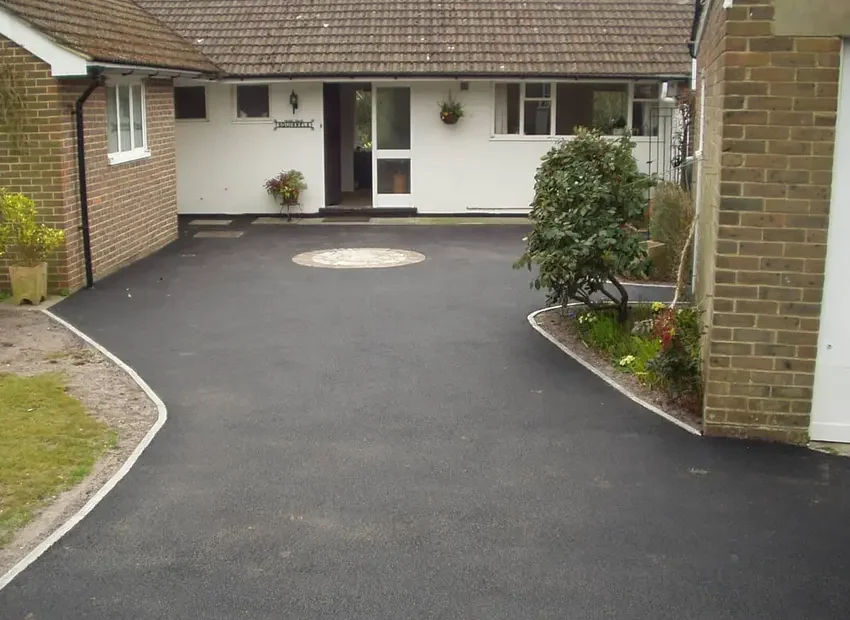Driveway sealing is essential for extending the lifespan of your driveway, protecting it from weather damage, chemicals, and physical wear. Whether you have an asphalt driveway or a concrete driveway, sealing helps prevent cracks and degradation, providing long-term protection. In this comprehensive guide, we will explore the cost of driveway sealing, the benefits, the best sealing products, and whether you should tackle the job yourself or hire a professional contractor.

Content
What is Driveway Sealing?
Sealing involves applying a protective layer to your driveway to shield it from harmful environmental factors like rain, snow, and oil spills. Asphalt sealing uses a specialized product to form a barrier on the surface, while concrete sealing helps prevent cracking and staining. Both methods preserve the aesthetics and durability of your driveway, offering an extra layer of defense against aging and wear.
Asphalt sealing is particularly important as it protects the surface from UV rays and harsh chemicals that can break down the materials. Concrete driveway sealing, on the other hand, prevents water from seeping into the concrete and causing cracks, which can be a significant issue during winter when freezing and thawing cycles occur.
The Benefits of Driveway Sealing
Driveway sealing offers numerous advantages that go beyond just visual appeal.

- Protects Against Weather Damage: Sealing helps protect asphalt driveways from the elements. Without sealing, rain, snow, and ice can cause cracks, leading to extensive damage over time.
- Enhances Durability: A sealed driveway resists stains from chemicals like oil and gasoline, which would otherwise break down the surface.
- Improves Aesthetic Appeal: Sealing your driveway restores its original color, making it look fresh and new. Asphalt sealant and concrete sealing can also help restore a uniform appearance after years of exposure to the elements.
- Winter Protection: Sealing protects driveways from freezing temperatures by acting as a waterproof layer, making driveway sealing for winter protection a necessity in colder climates.
How Much Does Driveway Sealing Cost?
The cost of driveway sealing can vary depending on several factors, including the size of your driveway, its material, and whether you opt for DIY or professional services. On average, homeowners can expect to pay anywhere from $0.15 to $0.30 per square foot for asphalt sealing. For a typical asphalt driveway of 600 square feet, the cost can range from $90 to $180.
If you decide to hire a professional, driveway sealing services might charge a flat rate or hourly fee, often ranging from $100 to $400. The price also depends on the condition of the driveway. If the surface has extensive cracks or requires driveway crack repair, the cost may be higher.
Choosing sealing packages or looking for promotions might also reduce costs, making it more affordable for homeowners on a budget.
Choosing the Right Driveway Sealing Product
Selecting the best driveway sealant is essential for ensuring a long-lasting, durable surface. Here’s a breakdown of common types:

- Coal Tar Sealer: This is a popular choice for asphalt sealing because it provides excellent protection against UV rays and water damage.
- Asphalt Sealant: Often used for newer asphalt driveways, this type of sealant is more flexible and ideal for expanding and contracting materials.
- Eco-Friendly Driveway Sealers: For environmentally conscious homeowners, there are eco-friendly options available that are free of harmful chemicals and petroleum-based products.
When deciding between asphalt sealants or concrete sealing, consider the specific needs of your driveway. Concrete sealers come in various finishes, including matte or glossy, and protect the surface from water penetration and staining.
How to Apply Driveway Sealing
Applying driveway sealant is a relatively straightforward process for homeowners willing to take on a DIY project. Here’s a step-by-step guide:
- Clean the Driveway: Use a pressure washer to clean the surface, removing dirt, debris, and any oil stains. This will allow the driveway sealant to adhere properly.
- Repair Cracks: Before sealing, fill in any cracks or holes using a crack filler or asphalt driveway repair product. This ensures a smooth surface for the sealant.
- Apply the Sealant: Using a roller or squeegee, apply the driveway sealant evenly across the surface. Work in small sections to ensure the sealant is spread uniformly.
- Let It Dry: Allow the sealant to dry completely, usually between 4-6 hours, depending on weather conditions. Avoid heavy traffic for at least 24 hours.
For those who prefer a professional touch, hiring a driveway sealing contractor can ensure a more thorough and even application, especially for large driveways or commercial properties.
How Often Should You Seal Your Driveway?
Driveway sealing is not a one-time job—it requires regular maintenance. Generally, you should reseal your asphalt driveway every 2-3 years, depending on the climate and wear. Concrete driveways may require sealing every 3-5 years. Signs that your driveway needs resealing include visible cracking, faded color, or the appearance of water stains.
During winter, driveway sealing for winter protection can prevent water from penetrating the surface, which might cause cracks when the temperature drops.
DIY or Hire a Professional: What’s the Best Option?
When considering sealing, homeowners have the option to do it themselves or hire a professional. There are pros and cons to both options:
- DIY Driveway Sealing:
- Pros: Cost-effective, flexible schedule, satisfaction of completing the job.
- Cons: Requires effort, time, and skill; mistakes can lead to uneven application.
- Professional Services:
- Pros: Experienced contractors provide a high-quality finish, especially for larger or more complex driveways.
- Cons: Higher upfront cost, but it ensures the job is done right.
For those unsure about asphalt driveway repair or dealing with extensive damage, hiring a professional contractor may be the best option.
Conclusion
In conclusion, driveway sealing is an essential maintenance task that not only improves the appearance of your driveway but also extends its lifespan by protecting it from weather, chemicals, and wear. Whether you choose asphalt sealing or concrete sealing, regular sealing ensures that your driveway remains durable and aesthetically pleasing for years.
Choosing the right sealant and application method is key. If you opt for DIY sealing, make sure to follow proper preparation steps and use high-quality products. However, for large or complex driveways, it’s always a good idea to hire professional sealing contractors to get the best results.
By maintaining your driveway with regular sealing, you can save money on repairs in the long run and enjoy a well-protected, attractive surface for years to come.
Driveway Sealing FAQs
Can I seal my driveway in cold weather?
Sealing is best done in moderate temperatures, ideally between 50°F and 85°F. Avoid sealing during freezing or excessively hot conditions.
How long does driveway sealing take to dry?
Drying time typically ranges from 4 to 6 hours, but it’s recommended to wait 24 hours before allowing vehicle traffic
Is driveway sealing necessary for new driveways?
Yes, sealing is crucial for new driveways, especially asphalt ones, to protect against premature wear and tear.

My name is Author Name. I post about home improvement ideas and how to make your home look beautiful and liveable. I hope my posts will help you with your DIY projects!




